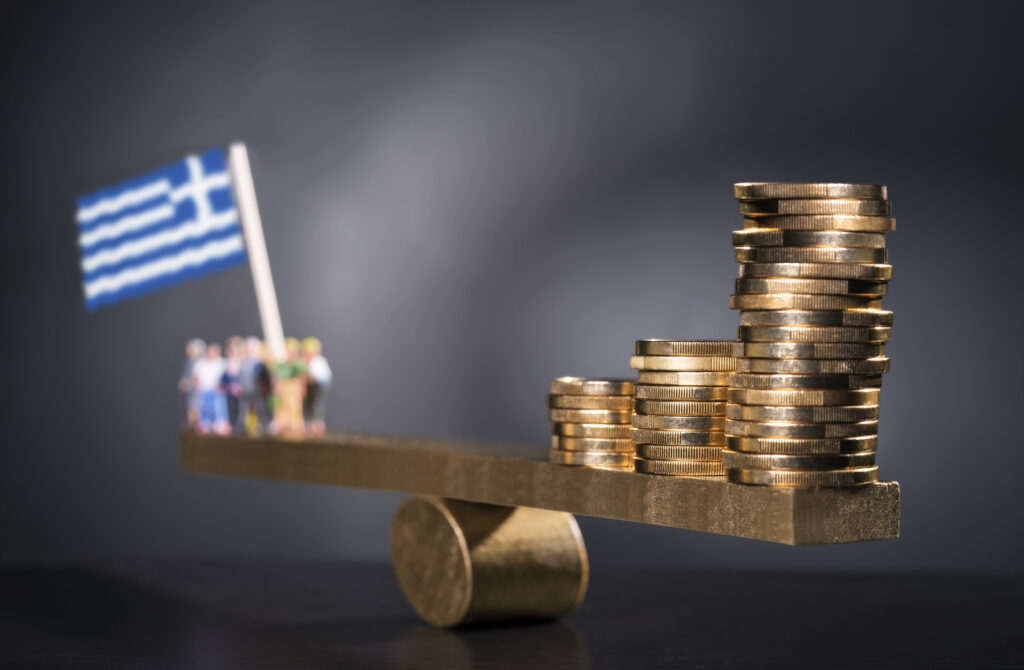Debt and moral obligation in Europe
Debt and moral obligation in Europe
The debt crisis in Greece raises an important question about the morality of debt. Do the interest and austerity that come with the debt actually do greater harm than good?
This article was written in preparation for our round table on interest and morality.
What is the right price to pay for the use of someone else’s money? The question of ‘interest’ has often challenged economists, politicians, and religious authorities. Many economists and politicians have argued in favour of a material determination of such a price as opposed to a moral one, claiming that economic forces must prevail over moral values. This conflict between the material and moral took centre stage in Europe over the past decade-and-a-half with Greece’s debt crisis.
Paying debts at all cost
The Greek economy crumbled as a result of the international economic crisis of 2009. Greece’s debt became unwieldy and threatened the eurozone. While some saw the Greek debt crisis as a global conspiracy, others, such as Greek Orthodox fundamentalists, saw it as a punishment from God. The crisis was a failure of their moral obligations towards God and each other, and this needed “an attitude of repentance and an attitude of dynamic defence of traditional values.”[1] In 2010, despite widespread protest and wildcat strikes in the country,[2] reactive austerity measures curtailing government spending were introduced by Greece first and then by the ‘troika’ – the European Commission, European Central Bank, and the International Monetary Fund (IMF) – who offered a bailout over concerns that the Greek crisis would impact the value and stability of the eurozone. Keynesian economists, such as Joseph Stieglitz, warned that the austerity imposed on Greece would fail, stifling growth and increasing: “We hardly needed another test. Austerity had failed repeatedly, from its early use under US President Herbert Hoover, which turned the stock market crash into the Great Depression, to the IMF “programmes” imposed on East Asia and Latin America in recent decades. And yet when Greece got into trouble, it was tried again.”[3] Despite this, the ‘troika’ defended austerity.[4]
The moral jeopardy of debt
Time perhaps proved the Keynesian economists right, with Greece meeting its obligations under the bailout but at great cost. In August 2018, Greece officially ended its reliance on the more than $330 billion in bailout money that it received. With the contraction in government spending, unemployment remained the highest in the eurozone and the Greek economy was about one-fourth smaller than it had been before the crisis.[5] Living in a country of budget cuts, reduced benefits and pensions, and high taxes, nearly one in three Greeks lived near poverty.[6] Vulnerable and minority groups within Greece were particularly affected. Greece’s dispersed Catholic minority faced severe hardships, which accounts for just three percent of Greece’s population of 11 million. Church leaders argued Catholics were facing the dual challenges of economic poverty and social isolation. In 2013, a 48 percent tax rise drastically reduced the Greek Catholic Church’s income, “forcing it to close charitable projects and cut clergy earnings.”[7] “Our whole church faces great difficulties,” explained Archbishop Nikolaos Printezis of Naxos, Andros, Tinos, and Mykonos, and secretary-general of Greece’s six-member bishops’ conference. “The state won’t help us, since it says we’re supported by the Vatican; and the Vatican can’t help us because we’re still considered a relatively rich country in the European Union.”[8]
There was strong outcry over the effects of austerity. Two Geneva-based international church groups declared that Greece was facing a humanitarian crisis, and appealed to the European Union (EU) to help the struggling nation. In an open letter, the secretaries-general of the World Council of Churches (WCC) and the Conference of European Churches (CEC) revealed that the country’s high youth unemployment and basic services were at risk. “In Greece, basic human services such as health care and even the availability of medicines are at severe risk,” the letter from the WCC and CEC said. “Together with the Church of Greece, we also take seriously the political and societal implications of growing racism and extremism in Greece,” it said. “These are storm clouds on the horizon that cannot be ignored or wished away.” Olav Fyske Tveit of the WCC and Guy Liagre of the CEC urged EU leaders to give “urgent and proper attention to the emerging humanitarian crisis in Greece.”[9] The EU had, for them, a moral obligation to help.
“A debt is a debt is a debt”
Yanis Varoufakis, a former economics professor who served as Minister of Finance in 2015 during the debt crisis, warned against the “short-sighted” austerity policies of the ‘troika’. Claiming that the rising authoritarianism of the ‘troika’ had stonewalled his efforts to resolve Greece’s debt crisis, he departed from his office to eventually create the left-wing political party MeRA25 in 2018, which promotes European internationalism, economic rationality, and social emancipation. Varoufakis has accused the EU of double moral standards, contrasting how Greece was treated in 2010 to what happened to Germany in 1953: “The German state was allowed to write off almost all its, very large debts, including those that were the result of forced loans extracted at gunpoint by the Nazis from occupied nations… So, eight short years after German troops had wrecked our continent, Europe and the United States gave the German people a chance to recover by striking off, at the stroke of a pen, a mountain of debt. Rightly so, I think. That write off was essential in bringing Germany back to the land of the living and kickstarting Europe’s revival.”[10] Greece, in contrast to Germany, Varoufakis argues, has been subject to a moral obligation to repay its debt: “Compare and contrast this to today when most German commentators refuse to countenance debt relief for the economically ravaged parts of Europe, arguing that if repaying the Periphery’s debts requires that the people of Greece or Portugal must be screwed into the ground, so be it: “a debt is a debt is a debt”. To say the least, this is a case of double standards.”[11] Based on what Varoufakis argues, it can be claimed that conflict between the material and moral in Europe has finally been decided in favour of the material.
Who fulfilled their moral obligations?
Did Europe fail in its moral obligations to help Greece, as Varoufakis argues? Does the repayment of interest and debt in general justify the economic and social devastation that Greece faced? Could Europe not have repeated its moral actions with Germany in the case of Greece? Many argue that Europe in fact did act morally. Since the debt crisis began in 2010, the various European authorities and private investors that took part in the bailout loaned over 300 billion euros to Greece, the biggest financial rescue of a bankrupt country in history. In return for the loan, the EU mandated Greece to adopt austerity measures so that it would strengthen its government and financial structures. Indeed, even Greece’s Finance Minister Euclid Tsakalotos characterised Europe’s continuation of its bailout program as a fulfilment of moral obligations.[12] But as Varoufakis’s MeRA25 claims, this perspective fails to see the moral failures of the larger economic system, which according to Varoufakis created these jeopardies of interest in the first place, while at the same time undermining Europe’s social contract with the poor and vulnerable.
Our team of analysts conducts research on topics relating to religion and society. In the past month, the topics of traditions, tension, corona, and leadership were trending. Find out their relationships on the EARS Dashboard.
[1] The Greek debt crisis as theodicy: Religious fundamentalism and socio-political conservatism – Efstathios Kessareas, 2018
[2] Greece – Greece’s debt crisis
[3] A Greek Morality Tale by Joseph E. Stiglitz
[4] A Greek Morality Tale by Joseph E. Stiglitz
[5] Greece – Greece’s debt crisis
[6] Greece – Greece’s debt crisis
[7] World | For Greece’s beleaguered Catholics, long crisis continues
[8] World | For Greece’s beleaguered Catholics, long crisis continues
[9] Debt crisis: church groups urge EU to help Greece
[10] Guilt, debt and interest rates: A comment on double moral standards
[11] Ibid.
[12] Europe has moral obligation to grant Greek debt relief: Tsakalotos






